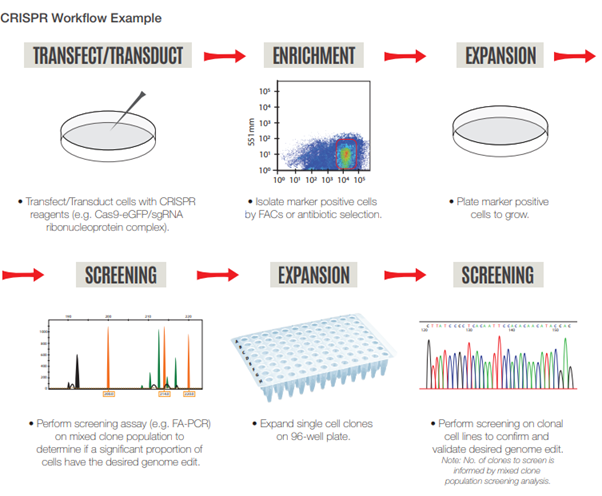Life science research often requires products with specifications unique to the cause of the research. If you cannot find what you need or you require some added features or services specific to your experiment, our Custom Research Services (CRS) can help tailor these specifications to your needs.
Outsourcing your projects eliminates common limitations like lab space constraints, lack of manpower, not having the expertise or equipment etc.
Our experienced CRS team provides technical expertise to a wide range of services. Each project is supplied with proper and detailed documentation for accountability upon completion.
Examples of tailored made projects are Site-Directed Mutagenesis (SDM), Genome Walking, SNP Genotyping, Mutation or Variant Screening, CRISPR Screening, and many more. We will propose the deliverables by using combination of several molecular biology methods, e.g. PCR, qPCR, Sanger Sequencing, Fragment Analysis, Next-Generation Sequencing or Third-Generation Sequencing. We aim to reach your experimental objective(s) at the most cost-effective way within the fastest turnaround time.
Site-Directed Mutagenesis (SDM)
Site-Directed Mutagenesis (SDM) is a method to create specific changes in a double stranded plasmid DNA. It uses combination of techniques from DNA synthesis and advanced-PCR. Each mutation site is defined as any combination of mutation within the frame of 50 bases. The mutation may be a single base change, multiple base changes, insertion, or deletion.
At the end of the final construction, you could have the options to verify the entire construct using Third-Generation Sequencing or only sequence the mutation site(s).
Genome Walking
Genome walking is a method for walking upstream or downstream (e.g. towards promoter regions) of genomic DNA from a known sequence, such as gene of interest (GOI) or transgene.
It is important that the provided known sequence was verified using Sanger sequencing before the genome walking. Instead of using the conventional method that using RE digestion with PCR and sequencing, we are using the advantages of long-read sequencing from Third-Generation Sequencing to locate the transgenic location within the genome in a much quicker way.
SNP Genotyping
A single-nucleotide polymorphism (SNP) is a variation in a single nucleotide at a specific location in the genome and is the most frequently occurring genetic variation in living organisms. SNPs are important markers that have been found in numerous studies to have an impact on gene function and phenotype. Hence, they have important applications in the medical and agriculture industries.
In humans, most SNPs are normal variants and have no effect on health or development. However, SNP profiling may help in predicting susceptibility to neurological disorders, risk of developing a particular disease or tracking the inheritance of disease genes in families. For example, the presence of two SNPs in the APOE gene codes for 3 different proteins which lead to varying levels of susceptibility for Alzheimer’s disease.
In agriculture, SNPs together with restriction fragment length polymorphisms (RFLP), amplified fragment length polymorphisms (AFLP), simple sequence repeats (SSRs), are used as molecular markers for marker-assisted selection (MAS) in plant breeding. In MAS, individuals or breeds that possess molecular markers which are linked to desired traits (e.g. higher yield, pest or disease resistance) are selected for breeding.
We could offer large scale SNP genotyping using either qPCR, Fragment Analysis or Next-Generation Sequencing.
Mutation or Variant Screening
Genome editing is the deliberate alteration of a selected DNA sequence in a living organism by means of insertion, deletion, or replacement of the sequence at a selected gene region. This technique incorporates the use of enzymes to cut DNA at targeted locations. Among the recent genome editing technologies, CRISPR-based methods are currently the most promising technique for genetic engineering. There are currently more than 14,000 publications on the CRISPR technology, from less than a hundred in 2011.
The Cas9 enzyme used in the powerful CRISPR approach cuts specific sites with great precision and could alter a gene at multiple sites in a single procedure, hence making it highly cost-effective as well. Plus, it works on most organisms.
Mutation screening, the detection and characterization of genetic mutations introduced into the host organism, is a major challenge in genome editing as it is tedious and time-consuming. Widely used methods for mutation detection include PCR-based methods such as mismatch cleavage assays and real-time PCR.
As part of the screening process, it is beneficial to first enrich for positive cells transfected with the required plasmids containing a marker such as GFP or antibiotic resistance, followed by a mutation detection assay on the pooled clones population to determine editing efficiency. Sequencing can then be performed on positive clonal cell lines to identify specific clones with the desired edit. This protocol can significantly reduce the overall cost of screening since the researcher is informed whether to proceed to each ensuing step of the experiment.
We could offer large scale mutation or variant screening using Next-Generation Sequencing.
CRISPR Screening Services
The CRISPR-Cas9 gene editing approach has generated much excitement as a powerful investigative tool in molecular biology and as a driver of precision medicine. Its surging popularity can be attributed to its relative simplicity, superior targeting efficiency and improvements to reduce off-target incidences.

However, researchers must grapple with challenges in the CRISPR-Cas9 experimental process, particularly in the confirmation of desired on-target mutation events.
We offer various methods for INDEL detection for CRISPR screening using Next-Generation Sequencing.
Custom Research Services Workflow

Be assured that all information will be kept in full confidence, with our customer holding the exclusive rights to all intellectual property pertaining to the project.
Contact us for more information for your customized project.
